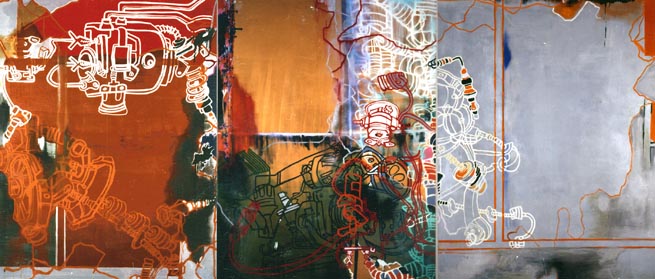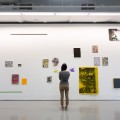Painting and Cinema, panel discussion

Painting and Cinema: Panel Discussion
Wed 10 Dec, 8pm
£5 / £3 Concessions / Free to ICA Members
Coinciding with the launch of the new Journal of Contemporary Painting, a peer reviewed academic journal published by Intellect, this panel discussion will address the complex relationship between painting and cinema.
In 1971 Stanley Cavell published The World Viewed, a text that explores the mechanisms of the frame and the screen and the role they play in the formation of the viewer’s relationship with the ‘world’ of a painting. The panel discussion will offer both direct and indirect responses to his ideas, with invited speakers showing short extracts from films of their choice and discussing the influence of Cinema on their painting practices.
The Journal of Contemporary Painting is edited by Rebecca Fortnum, Beth Harland, Michael Finch and Daniel Sturgis and published by Intellect.
Panel: Lydia Dona, Kaye Donachie, Dan Hays and Mario Rossi
Chair: Professor Beth Harland
Lydia Dona is an American artist, born in Romania, who lives and works in New York City. She has shown extensively nationally and internationally in various galleries and museums. Her work is included in the Phaidon publication of Painting Today, by Tony Godfrey.
Kaye Donachie lives and works in London. She holds a MA from Royal College of Art (1997). Recent solo and group exhibitions include: Maureen Paley (2013) Portraits of Solitude, Hernan Bas & Kaye Donachie De la Cruz Collection Project Space, Miami, Florida (2014).
Dan Hays completed a PhD at Kingston University in 2012, which included the exhibition Screen as Landscape at the Stanley Picker Gallery. Exploring the relationship between the intangible, encoded realm of the digital screen and the palpable, time-consuming nature of painting has been the main focus of his work since 1999.
Mario Rossi is a Senior Lecturer in Fine Art in Central St Martins, University of the Arts London. His concerns are with the enduring potential of the painted image, the interchanges between cinema and painting and exploring and disrupting hegemonic structures of representation.
Beth Harland is an artist and Professor of Fine Art at Lancaster University. She is principal investigator of a research project in collaboration with the Centre for Visual Cognition at the University of Southampton, looking at theories of absorption and viewer acknowledgment.





